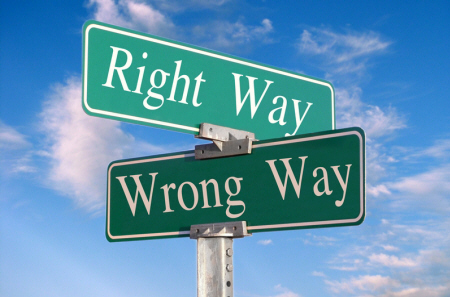- The observation of consequences (reward and punishment) is an important part of learning moral values.
 This is Part 4 in my series on "Morality" as derived from my new eBook "Stand Up for MORALITY."
This is Part 4 in my series on "Morality" as derived from my new eBook "Stand Up for MORALITY."
In Part 3 we discussed how Morality affects our culture. Here, in Part 4, we will discuss how Morality is taught and learned.
HOW IS MORALITY TAUGHT/LEARNED?
Some psychologists believe that sociopaths are "born without a conscience." More likely they were never taught the concepts of kindness, fairness, love and compassion; that these are admirable traits. As such, they never developed a conscience.
Morality is taught either through formal or informal training, using words and examples. The printed word is useful, but the spoken word is perhaps more effective, whether it is communicated by parents, teachers, clergy, managers, or peers. Examples are even more persuasive and represent live models of what is acceptable forms of behavior. Observations of the actions of our friends and foes, or our heroes and villains, all play a substantial role in our perspective of right and wrong, particularly if they are rewarded or punished (or not). To illustrate, a student observes another student plagiarizing on a paper. Instead of being penalized, the offending student receives an "A" for his efforts. The first student then comes to the conclusion plagiarism is an acceptable form of behavior. Likewise, a worker witnesses a coworker cheating a customer to earn a little extra pocket money. The indiscretion is not detected and, as such, the first worker concludes cheating customers is acceptable and does likewise. If the transgression continues for a period of time, and the cheaters are finally apprehended, they are perplexed about their punishment as they perceived their actions as an acceptable form of behavior.
The observation of consequences (reward and punishment) is an important part of learning moral values. In the event an offender is caught committing a crime, and the person's superior does nothing to discipline the person (such as the teacher or manager in the examples above), this too is observed by others and influences values. If a person concludes there is no significant penalty for being immoral, a person may very well risk emulating the offender. Likewise, if a person observes another being rewarded for something they have done, others may very well follow the role model's example. This is why role models play a significant role in our society. If a manager strongly advocates a code of conduct, yet doesn't practice it himself, his employees will more likely follow his example as opposed to the code. The phenomenon of, "Do as I say, not as I do," presents a genuine problem for teaching morality.
The entertainment industry is often accused of transmitting mixed signals of morality in movies, television, radio, and the Internet. The media greatly influences our sense of right and wrong, not just by comedy and drama, but even in the presentation and interpretation of news. By defining the characteristics of heroes and villains, the media is presenting role models for others to pattern their lives after.
When establishing our moral values, we are ultimately establishing our allegiances to certain parties. By doing so, we are expressing supreme confidence in their judgment. As such, we ultimately derive our values from such institutions. It also defines our loyalties.
As a group exercise, ask attendees to privately pick the top three institutions they supremely trust. This can be done two ways: by distributing slips of paper to the audience, collecting them afterwards, and compiling the results, or; simply asking for a show of hands as to how they voted.
PICK TOP 3 INSTITUTIONS YOU SUPREMELY TRUST IN TERMS OF MORAL VALUES (1, 2, 3)
- Church/Religion
- Company
- Country
- Cultural Heritage or Race
- Entertainment Industry
- Family members
- Fraternity
- Friends
- Gang
- Government
- Military
- News Media
- Political Party
- School
- Sports Team
- ___________(other)
- None of the Above
- Company
- Country
- Cultural Heritage or Race
- Entertainment Industry
- Family members
- Fraternity
- Friends
- Gang
- Government
- Military
- News Media
- Political Party
- School
- Sports Team
- ___________(other)
- None of the Above
Not surprising, the top three answers are typically, Family, Church, and Country. The answers will vary based on the age of respondents. For example, how teenagers perceive the world is substantially different than older people. Nonetheless, the answers here provide great insight into who influences you, and how your moral values are derived. Undoubtedly this will change with the passing of time as we find faults with the institutions.
NEXT TIME: In Part 5, consider the other institutions affecting morality.
"Stand Up for MORALITY" is an eBook available in PDF, Kindle and Audio formats.
All are available through MBA Press.
The Kindle version is available through AMAZON.
All are available through MBA Press.
The Kindle version is available through AMAZON.
Mr. Bryce is available to speak on this subject
Keep the Faith!
Note: All trademarks both marked and unmarked belong to their respective companies.
 Tim Bryce is a writer and the Managing Director of M&JB Investment Company (M&JB) of Palm Harbor, Florida and has over 30 years of experience in the management consulting field. He can be reached at timb001@phmainstreet.com
Tim Bryce is a writer and the Managing Director of M&JB Investment Company (M&JB) of Palm Harbor, Florida and has over 30 years of experience in the management consulting field. He can be reached at timb001@phmainstreet.com
For Tim's columns, see:
timbryce.com
Like the article? TELL A FRIEND.
NEXT UP: STAND UP FOR MORALITY (PART 5 OF 8) - The observation of consequences (reward and punishment) is an important part of learning moral values.
LAST TIME: STAND UP FOR MORALITY (PART 3 OF 8)
- Our actions are based on our perceptions and sense of morality.
Listen to Tim on WJTN-AM (News Talk 1240) "The Town Square" with host John Siggins (Mon, Wed, Fri, 12:30-3:00pm Eastern), KGAB-AM 650 "The Morning Zone" with host Dave Chaffin (weekdays, 6:00-10:00am Mountain), and KIT-AM 1280 in Yakima, Washington
"The Morning News with Dave and Lance" with hosts Dave Ettl & Lance Tormey (weekdays. 6:00-9:00am Pacific). Or tune-in to Tim's channel on YouTube.
Also look for Tim's postings in the Palm Harbor Patch, The Gentlemen's Association, and throughout the Internet.
 I noticed something recently when driving around town with the radio on. Whenever a commercial comes on, I automatically do one of three things: search for another station, "tune out" completely, or turn the radio off. I believe it's a Pavlovian response. Most of the time, I just tune it out. Do not ask me what the commercial was about as I haven't got a clue. No wonder advertisers tend to increase the volume, people simply find them annoying and drift off to Neverland.
I noticed something recently when driving around town with the radio on. Whenever a commercial comes on, I automatically do one of three things: search for another station, "tune out" completely, or turn the radio off. I believe it's a Pavlovian response. Most of the time, I just tune it out. Do not ask me what the commercial was about as I haven't got a clue. No wonder advertisers tend to increase the volume, people simply find them annoying and drift off to Neverland.
 I have been working on a project aimed at teaching morality in a uniform manner. This has caused me to examine the properties of morality and consider the causes for its decline in this country. One key variable is our changing sense of tolerance; what was not considered permissible in one generation, may be considered acceptable in the next. For example, back in the 17th century a fiddle was viewed as "an instrument of the devil" as it led to dancing, which was considered sinful at the time. This is certainly not true anymore, but we now have become more "Politically Correct" (P.C.) in order to not offend a class of people, be it based on race or gender. Frankly, I find most of the P.C. language and customs to be hypocritical, but that is me. Others follow P.C. religiously.
I have been working on a project aimed at teaching morality in a uniform manner. This has caused me to examine the properties of morality and consider the causes for its decline in this country. One key variable is our changing sense of tolerance; what was not considered permissible in one generation, may be considered acceptable in the next. For example, back in the 17th century a fiddle was viewed as "an instrument of the devil" as it led to dancing, which was considered sinful at the time. This is certainly not true anymore, but we now have become more "Politically Correct" (P.C.) in order to not offend a class of people, be it based on race or gender. Frankly, I find most of the P.C. language and customs to be hypocritical, but that is me. Others follow P.C. religiously.
 Every now and then I encounter a programmer who adamantly contends you cannot have an information system without some form of computer support. Actually, we've had such systems well before the advent of the computer. As we jokingly contend, the first on-line, real-time, interactive, data base system was double-entry bookkeeping which was developed by the merchants of Venice in 1200 A.D. It may have been a manual system, but it worked rather effectively, and still does. Suggesting you can't have a system without a computer reveals the person's naivety. Admittedly, computers can now be found throughout the corporate world, be it large corporations or small businesses, but systems transcend the use of the computer.
Every now and then I encounter a programmer who adamantly contends you cannot have an information system without some form of computer support. Actually, we've had such systems well before the advent of the computer. As we jokingly contend, the first on-line, real-time, interactive, data base system was double-entry bookkeeping which was developed by the merchants of Venice in 1200 A.D. It may have been a manual system, but it worked rather effectively, and still does. Suggesting you can't have a system without a computer reveals the person's naivety. Admittedly, computers can now be found throughout the corporate world, be it large corporations or small businesses, but systems transcend the use of the computer.
 Before graduating from college, I played my fair share of contact sports, including football, baseball, hockey, and rugby. Like a lot of kids, I got pretty beat up in the process, such as cuts, scrapes, bruises, sprains, and a particularly nasty knee injury which sidelined me for the remainder of a season. Nonetheless, I loved playing and think back fondly on those years.
Before graduating from college, I played my fair share of contact sports, including football, baseball, hockey, and rugby. Like a lot of kids, I got pretty beat up in the process, such as cuts, scrapes, bruises, sprains, and a particularly nasty knee injury which sidelined me for the remainder of a season. Nonetheless, I loved playing and think back fondly on those years.

 One of the most important pieces of legislation passed by our first Congress in 1789 was the
One of the most important pieces of legislation passed by our first Congress in 1789 was the  I cringe when I hear someone say, "A cluttered desk is the sign of a brilliant mind." I don't know who invented this little gem, some say Albert Einstein, but I can't seem to find any record of it. More likely, it was some slob who got called up on the carpet by his boss for running a pigpen.
I cringe when I hear someone say, "A cluttered desk is the sign of a brilliant mind." I don't know who invented this little gem, some say Albert Einstein, but I can't seem to find any record of it. More likely, it was some slob who got called up on the carpet by his boss for running a pigpen.
 I wonder how many meetings I've attended in my lifetime. It must be in the thousands. Of course, there have been the multitude of corporate meetings I've participated in, either with customers or internally. Then there are the many meetings I've attended over the years from the many nonprofit organizations I've belonged to, not to mention several meetings for the Board of Directors I have been involved with (more than 50 now). Sometimes I feel like I am more in the business of attending meetings as opposed to doing anything else.
I wonder how many meetings I've attended in my lifetime. It must be in the thousands. Of course, there have been the multitude of corporate meetings I've participated in, either with customers or internally. Then there are the many meetings I've attended over the years from the many nonprofit organizations I've belonged to, not to mention several meetings for the Board of Directors I have been involved with (more than 50 now). Sometimes I feel like I am more in the business of attending meetings as opposed to doing anything else.